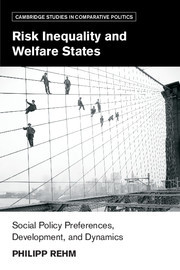Description
Risk Inequality and Welfare States
Social Policy Preferences, Development, and Dynamics
Cambridge Studies in Comparative Politics Series
Author: Rehm Philipp
Focusing on distribution of risk within societies, this book presents a parsimonious theory of social policy emergence, divergence, and change.
Language: English
Subject for Risk Inequality and Welfare States:
Approximative price 31.58 €
In Print (Delivery period: 14 days).
Add to cart
Risk Inequality and Welfare States
Publication date: 05-2016
246 p. · 15.3x22.8 cm · Paperback
Publication date: 05-2016
246 p. · 15.3x22.8 cm · Paperback
Approximative price 90.29 €
In Print (Delivery period: 14 days).
Add to cart
Risk Inequality and Welfare States
Publication date: 05-2016
Support: Print on demand
Publication date: 05-2016
Support: Print on demand
Description
/li>Contents
/li>Biography
/li>
The transformation of night-watchman states into welfare states is one of the most notable societal developments in recent history. In 1880, not a single country had a nationally compulsory social policy program. A few decades later, every single one of today's rich democracies had adopted programs covering all or almost all of the main risks people face: old age, sickness, accident, and unemployment. These programs rapidly expanded in terms of range, reach, and resources. Today, all rich democracies cover all main risks for a vast majority of citizens, with binding public or mandatory private programs. Three aspects of this remarkable transformation are particularly fascinating: the trend (the transformation to insurance states happened in all rich democracies); differences across countries (the generosity of social policy varies greatly across countries); and the dynamics of the process. This book offers a theory that not only explains this remarkable transition but also explains cross-national differences and the role of crises for social policy development.
1. Introduction; 2. Theoretical framework; 3. Preference formation; 4. Risk perceptions; 5. Risk pools and social policy popularity; 6. Risk pools and social policy retrenchment - German unification; 7. Risk pools and social policy adoption; 8. Crises and social policy; 9. Conclusion.
After receiving his master's degree in Germany and his PhD from Duke University, North Carolina, Philipp Rehm worked at the University of Oxford, the European University Institute, and Ohio State University. His work on risk and welfare states is published in leading journals, such as the American Political Science Review and World Politics.
© 2024 LAVOISIER S.A.S.




